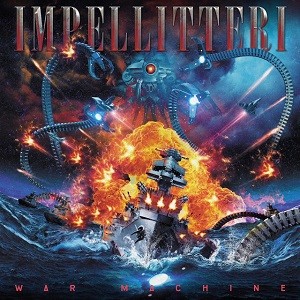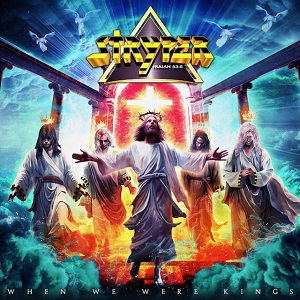THE WINERY DOGS – “Once You Succumb To The Temptation, It’s Nothing That You Thought It Would Be”
February 2, 2023, a year ago
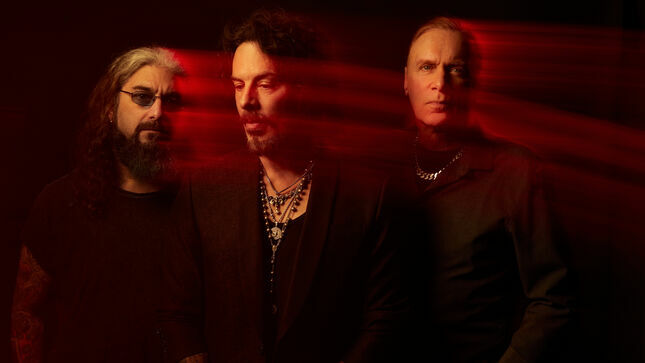
It was ten years ago, in 2013, that The Winery Dogs first marked their musical territory with the release of an astonishing self-titled debut album. On February 3, 2023, vocalist / guitarist Richie Kotzen (Poison, Mr. Big, Forty Deuce), bassist Billy Sheehan (Talas, David Lee Roth, Mr. Big) and drummer Mike Portnoy (Dream Theater, Adrenaline Mob, Sons Of Apollo) return with their third album, appropriately titled III.
“I’m very much looking forward to releasing the album,” begins Richie Kotzen. “I’ve been chomping at the bit to get out there and let people hear the music, and of course get back on stage with Billy and Mike.” It has been a while since The Winery Dogs were on stage together, even longer since the last studio album, Hot Streak, which was released in 2015.
“Yeah, but it’s not as long as people think though,” clarifies Kotzen. “The reality is, although Hot Streak did come out in 2015, we toured all the way into 2017, and ended that cycle with a live performance DVD (Dog Years) that we released. Then, we did get back together in 2019, and did about a month and a half worth of shows in North America. At that point, after that run, we had discussed going in and making a third album. Then, obviously the pandemic hit, and everything derailed. But I don’t think we really intended to have as long a break as we did. But thankfully we were able to get together in 2021 and do some writing, which led us to the position we’re in now.”
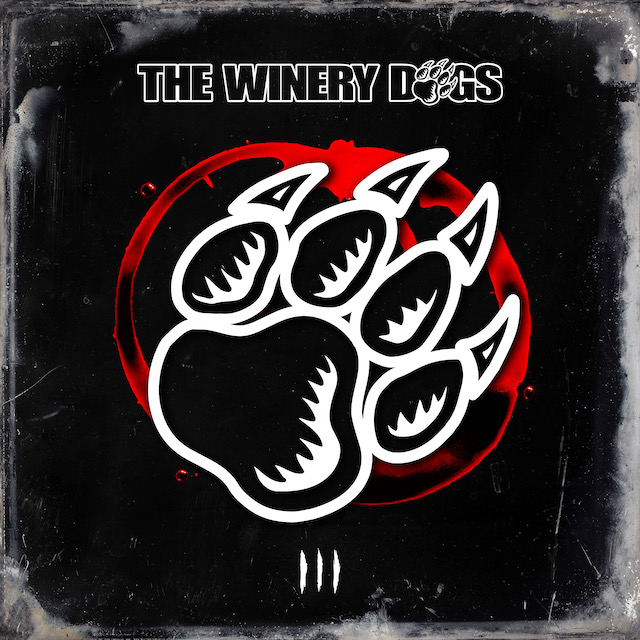
That was in the summer of 2021, when Kotzen, Sheehan, and Portnoy got together at Richie’s home studio in Southern California to create this music face to face. “Yeah, we got together twice over the summer,” recalls Kotzen. “We went in like we always do. Basically, we set up in a tracking room; the drums are in there, Billy’s got his bass, and obviously I have my guitar and a microphone set up. And we pretty much just kind of throw ideas around. If something excites the three of us, then we’ll develop it. So, the idea might come from me or Billy or Mike, but ultimately, we start sharing our ideas in what direction things should take. Try this chord, try that. Once we get to a certain place, we will structure it as if it were a composition, which is interesting because we’re structuring things before the lyrics exist, before the melody’s solidified. But once we have enough of these skeletons of songs, then it’s up to me to live with them for however long it takes to come up with a storyline, some lyrics, make a commitment as it relates to melodies. But the initial writing process is really a lot of fun because it comes down to three guys in a little room sort of jamming and throwing around ideas.”
The old-fashioned way. None of the modern method of electronic file-sharing. “I mean, you can do that stuff, but I almost find that’s more time-consuming cause you’re going back and forth. ‘I like this bit, I don’t like that, can you try this?’ You record the file, then you export it, then you upload it, then the person downloads it. On paper, it seems like a great way to work, but the reality is, to me, it’s a hassle. I much prefer being in a room. Even to the degree that when I work with Adrian (Smith from Iron Maiden on Smith / Kotzen), we have to be in the room together. Once we get ourselves to a point where we write the material, if Adrian wants to go into his studio over the weekend and record some guitar solos – great! I don’t need to be there for that. But as far as writing is concerned, I really like the idea of being in a room with somebody, as opposed to sending files.”
“Xanadu” is the first track on III, and it was also the first single / video to be released from the album. The word Xanadu has many connotations: it’s a beach resort and marina in the Bahamas, it was a movie starring Olivia Newton-John, it’s a Rush song, it was a video game. Kotzen explains what Xanadu means to him. “Well, Xanadu, regardless of all the things you mentioned, is in fact a word in the English dictionary. The official definition of the word Xanadu is an idealized place; an idyllic, magnificent place. So, that’s how I look at it. It’s a word in our language with a very specific definition. The way the song was written, was basically out of an improvisation. It was the first song that I worked on with the band, as it relates to coming up with lyrics and melodies. I remember vividly, it was late at night, and I thought, let me go through and take inventory on what we had done. That track came up, and I started recording myself. I was really, basically improvising. I came up with this phrase, ‘Maybe I will, maybe I won’t, won’t do this, won’t do.’ I ended the phrase with the word ‘do,’ and somehow, I was spinning all these things and at one point I said, ‘Maybe I’m getting lost in the Xanadu.’ Maybe I’m getting lost in this wonderful, idyllic place that I had created in my mind. At that point, I was like wow, I think I have something. I’ve got a vibe, I’ve got a concept, a topic. So, I thought, I’m going to write this about being in a wonderful place – mentally, physically, spiritually. Then I’m going to have a juxtaposed position of the general people around me trying to f*ck it up for me.”
“People ask, ‘What’s the song about?’ There’s a line in there where I mention the word Malibu, just because that’s where I live, and it happened to rhyme; the song has nothing to do with Malibu. This song is about being in an idyllic place, literally the definition of the word. But then having to deal with the other folks trying to f*ck things up for you and pull you off your game. That’s really what the song’s about. It came together quite naturally. Anytime something comes out of an improv, and you’re talking about lyrics and it’s freestyle and it just happens… my attitude is, you’ve got to roll with it because it’s coming from somewhere that you just don’t know. I hate questioning where inspiration comes from. But the last thing I’ll tell you about the song is that when I played it for the boys the next morning and the track ended, Billy put his arms in the air; he was in the front seat of my truck, and he said, ‘I’m sold!’ And Mike chimed in as well. I had the boost of confidence that I needed to keep going down the road. Had there been a lukewarm reaction, it probably would have destroyed the process of making a record. But we got on a roll from there, one thing led to another, and now we’ve got an album.”
The aforementioned “other folks” seem to carry over into “Mad World”, the second song on the album, as well the second single / video. That song describes the polar opposite of an idyllic paradise; it’s the chaos, the commute, the grindstone. It’s almost a socio-political commentary with Kotzen urging people to “Get off the bus.” “Yeah, and you know, it’s funny. That song, that first line came to me and I sang, ‘Get on the bus, do the exercise, you better bite your tongue so you sound the same.’ That little verse came very quickly and I thought, wow, this really kind of sums up how we’re sort of being trained a little bit – in my opinion, compared to the way things were when I was young. When I was a young man, you were encouraged to be an individual, a free thinker, to get out there and make something of yourself. Don’t look to outside resources for support. Figure it out on your own. My father came from nothing and found a way to run a business. That whole thing – focus, do the work. And unfortunately, now, it just seems like we have this whole other kind of thing where people want to be… coddled, I guess is the word. It’s a different attitude. Hey look, to each his own. I’m going to turn 53 next week, and I’m very happy with the way things went for me. It’s just a look at how different the attitude is in today’s time, compared to the way it was when I was a young man. I left home young and went off to do my own thing. Things were very, very different; I guess I sound like an old man now. But that’s kind of where the attitude is coming from with that song.”
Each of the ten songs on III are outstanding, but “Breakthrough” is particularly special as it strikes such a unique chord. “I think my favorite line in that song is, ‘Because we’re who we are, we’ll never be what we were.’ I think that’s such a powerful sentiment,” admits Kotzen. “The song is literally a song about seduction, but in the way that once you succumb to the temptation, it’s nothing that you thought it would be. As a matter of fact, it’s a bit of a nightmare. When the song was written, I had the melody and I had some words in mind that I was walking around the house humming. Every now and then I would sing, ‘I’m falling and breaking.’ In my mind, I thought I’ve got to start the chorus with that. But then I was kind of struggling over a couple of days to figure out where to go with that. Mike had overheard me and said, ‘You keep singing that. I hear you sing, “I’m having a breakthrough.”’ I thought yeah, how can I phrase that? Again, usually this happens in the evening. One night I was messing with it, let me try and do what he said – ‘I’m having a breakthrough.’ From there, I was able to come up with the story, and it kind of wrote itself. Sometimes you just need that little spark to change course and get around whatever wall is stopping you from your creativity. Thankfully Mike said that.”
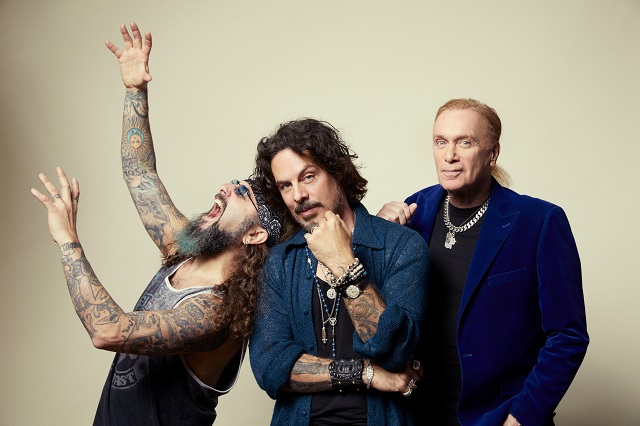
III is well varied with different song lengths and multiple tempos. It’s quite remarkable because all three musicians are masters at their instrument, and everybody gets to shine individually as well as collectively. There’s a bit of a ‘70s funk / soul vibe permeating throughout the album as listeners are treated to enthralling virtuoso performances. The Winery Dogs make it all seem so easy, what’s the secret? “One of the great things about the group is that there’s three of us. Just by that very fact, the communication is less cloudy. The more people there are communicating, the more information you have; you have to find a way to process all that. So, first of all, there’s three of us. Second of all, because we’ve been working together on and off for so long, we really, really know each other really well. Obviously as friends, but I mean musically, we know whose wheelhouse is what so to speak. Inside of knowing that, it created a situation where the level of musical trust that has evolved inside the band is higher than it’s ever been. On this album, I think it was probably the easiest album for us to make. And for me, it’s my favorite one. Now I know that usually happens to an artist when they make a record. You never hear anyone say, ‘Listen to my new record, it’s terrible.’ Typically, everybody loves their latest work. But that’s the way it should be, and that’s how you know, hey, I should release this. Cause if all three of us didn’t love it, you wouldn’t know it existed. To me, that’s the main criteria.”
“Gaslight” is the most energetic song on III. Lyrically, its subject matter is not a streetlight powered by natural gas. The song is about psychological manipulation with the aim of causing self-doubt and confusion, an abuser and a victim. Kotzen reveals what prompted the line, ‘Do what you want to do, but don’t gaslight me.’ “So many times, so many of us could come up with an instance where it’s like – wait a minute, I know what I said, I know what I did, and I know what happened. Then suddenly it’s twisted. That’s really where it stems from. Now, I didn’t sit down and contemplate over a specific instance where this happened to me; I don’t relive those sort of memories, cause they’re relatively meaningless once you get past them. So, I couldn’t tell you exactly where it came from. But the concept itself is something the majority of us, at one point or another, have experienced. Maybe they don’t know what the term is when someone does that to you, but so many people have been in that position, I’m sure.”
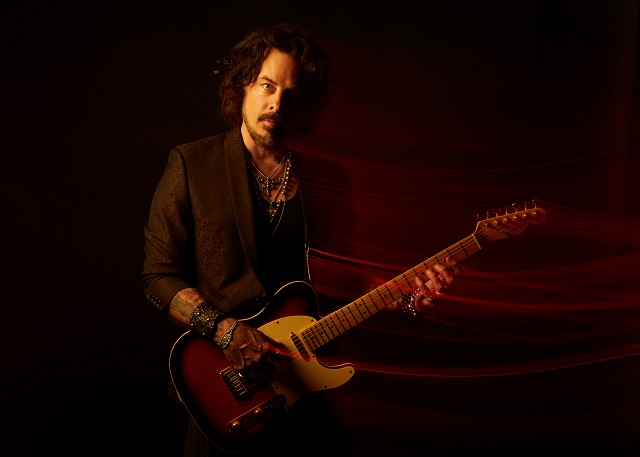
“Lorelei” was inspired by a German poem written by Heinrich Heine (1797 – 1856). “Yeah, that came out of me, again, improvising a melody. I sang something when I was demoing the melody, not really knowing what I was singing. I listened back, and it sounded like I’m saying Lorelei. Okay, wait a minute, I can go here with this story. I kind of twisted it a little bit to my own perspective. But yes, you’re on point there, it was definitely inspired by that.” The works of Heinrich Heine, who died over 150 years ago, aren’t part of the American high school curriculum. Kotzen attributes his introduction to the poem to his love of reading. “I read different, various books. There’s a book I read long ago called The 48 Laws Of Power by Robert Greene. It was at a period in my life where I felt very strange, confused, lost a little bit, disenchanted with people and situations I went through. I read that book, and one of the things I loved is that he would bring up a concept, and he would call it a law. He would say, ‘Law #36 – Despise The Free Lunch’, or whatever it is. Then he would define what he meant by that, and then he would take it a step further, cause he had a degree in historic literature. He would talk about Caesar and Cleopatra, and this and that. He would give you an example from many, many moons ago. I don’t know that I got it out of that book, but it’s probably something I read somewhere in the past that I retained. It’s hard for me to pinpoint exactly how and why and when and what. But it does exist, the song is there.”
Musically, “Lorelei” is such a sultry, silky, bluesy number. It couldn’t be more contrasting to its aggressive predecessor, “Gaslight”. Putting those two songs back-to-back on the album really showcases the diversity of The Winery Dogs. “Thank you. I’ll tell you a funny story about that song. Originally, when it was written, the song actually stemmed from a riff that Billy Sheehan played on the bass. It was that ascending… he’s playing these chords in the beginning, he’s going up the neck, and he ends the phrase with a bend on the bass, which is something that you don’t really hear a lot of bass players do. And he does it in such a signature way, it’s very effective. When he was doing that, I said, ‘That sounds like it could be used in a song.’ So, we kind of went in this other direction where I came up with the chord progression.”
“But what I wanted to tell you is that the song was originally much faster. I heard it as like a shuffle, and we had recorded the whole thing at that tempo. Mike was like, ‘It would be so cool if it was slow.’ Then I was arguing, and my argument was, I’m singing this at the higher end of my vocal range in the chorus. I need this to go by fast, so that I’m not stuck having to sustain a ridiculously high note for a certain period of time. Mike was like, ‘I don’t care about any of that; it’s better slower.’ We got into this debate, and I said, ‘I’m not retracking this.’ Finally, I said, ‘Well slow it down.’ So, we slow the whole song down in Pro-Tools, and of course it sounds weird in Pro-Tools, cause you have all the artifacts. I was listening to it and Mike said, ‘Sing the melody now.’ So, I sang my melody and I’m like, ‘Ah – you’re right! We have to do it slow.’ So, then we went back, and we recut the whole song at the new tempo, and we ended up with what you hear on the album.”
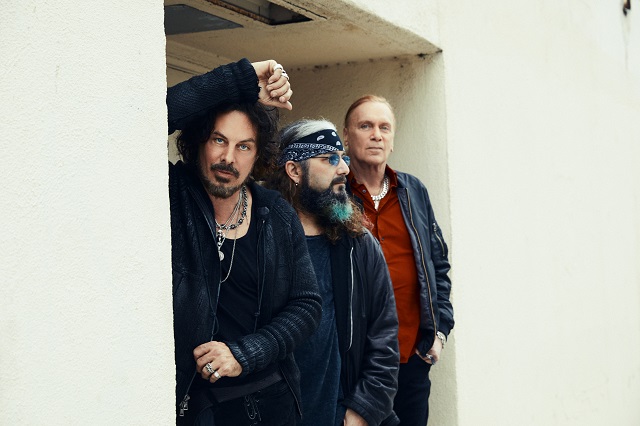
Unlike many new releases, III is devoid of bonus tracks, deluxe editions, or songs exclusive to one format. “We just wanted to make a strong album,” states Kotzen. “We don’t like the idea of filler. We don’t like the idea of repeating ourselves. We just decided that we need ten songs. We had more ideas, but these were the ten that got developed. I know, somewhere on a hard drive, there’s a song that I was developing, which would have been an 11th song. I played Hammond Organ on it; I remember I did a solo. I think it’s on my Instagram if you go deep enough. I had an idea for a chorus, and then I just kind of ran out of gas back then. I was done writing, let me focus on these ten, and the boys agreed. So, that’s where we’re at. But look, we’re going to be on the road together, we’ll be at soundcheck and someone might play something, record it, and there you go – we have cause to go back in the studio again.”
Before wrapping up, Kotzen peels back the layers on one more of these ten new songs, “The Vengeance”. It contains another interesting lyric, “I’m not talking anymore, nobody’s listening.” Obviously, all The Winery Dogs fans want to hear what Richie has to say, but that’s not the viewpoint here. It comes from an average person’s perspective when their words become noise and nobody’s actually hearing what’s being said. “Of course, that happens all the time. That happens in your home life, it happens in your business, at work. Sometimes there’s a problem and you have a solution, but you’re dealing with an obstructionist. They want to tell you why you can’t do something. I experienced that very young. I will say this, I’ve got a wonderful relationship with my parents. But when I was a young man, a teenager, I learned really quick that I needed to get out of Birdsboro, Pennsylvania as quickly as possible. I remember, at the age of 18, I went to San Francisco to make an album, and I met friends during those couple of months. I realized this is where I want to live. So, I started getting it in my head that I would move to San Francisco. Every time I would bring it up, my family would be like, ‘Rich, you can’t just get up and leave.’ You can’t do this. You can’t do that.”
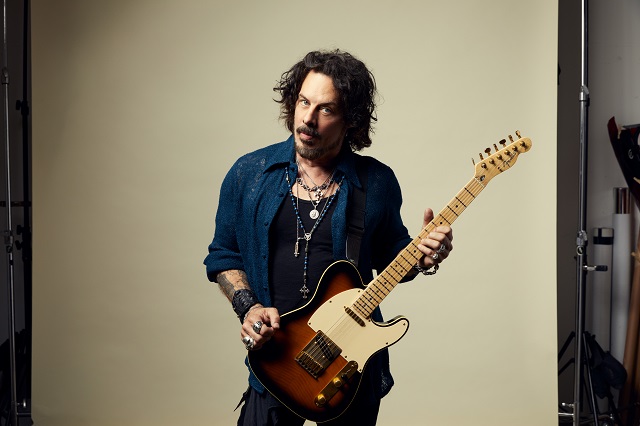
“I went to Los Angeles to perform at a benefit concert for my friend Jason Becker (who suffers from ALS). And by then I had signed a recording contract with Interscope, and they had given me money. I was staying with a friend and I said, ‘I have a day off, you have the day off. How do you feel about me looking at a couple places to live?’ So, I found a guest house in Los Feliz, and it was a beautiful Spanish-type house. It was affordable, and I told the lady it was month to month. It was furnished. I can’t lose, I’m going to take it. I’ll guarantee three months, and I’ll probably stay longer. So, I gave her the deposit and I called home. I said, I need you to send me blah, blah, blah; whatever it was. They said, ‘What are you talking about?’ I said, ‘I’m going to stay.’ And that’s how I moved and left home. Ultimately, once I got here, my family was supportive. But it’s that being obstructed from something that you know you need to do. You asked about ‘The Vengeance’. ‘The Vengeance’ isn’t necessarily about that, but there’s a line there that could be applied in many different life situations – ‘I’m not talking anymore, nobody’s listening.’ I’m just going to go do whatever it is I gotta do and keep quiet about it.”
Calling the song “The Vengeance” implies revenge, like you’re out for blood. But it doesn’t really get into that territory. “No, that’s the thing. It’s one of those songs where the title isn’t necessarily sung. But there’s a line in the song… ‘The weak seek revenge, the strong forgive, and the wise ignore.’ That’s an expression that’s been said many different ways by many smart people. After that I sing, ‘I’ve got no vengeance.’ The attitude is someone’s done me wrong. I’m not going to waste my energy trying to go eye for an eye. I could forgive them, but how about if I just ignore the whole situation and completely move on. Just eliminate this from my path. That’s basically where I’m coming from on that song.”
And The Winery Dogs will be coming to a concert hall near you. Richie Kotzen, Billy Sheehan, and Mike Portnoy are touring extensively in support of III. A complete list of dates can be found on the official tour poster, pictured below.
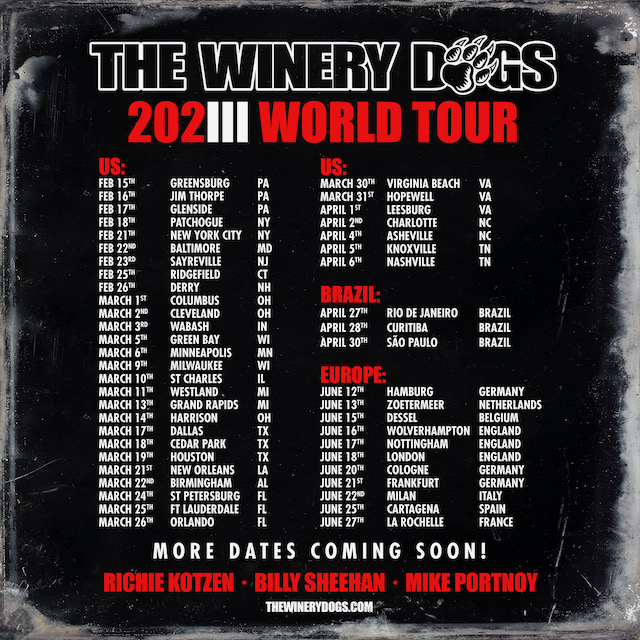
(Photos by Travis Shinn)










